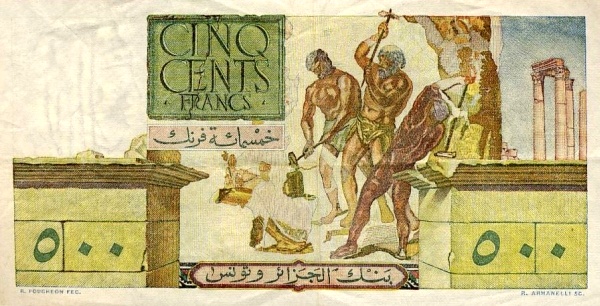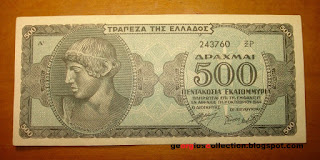POW Camp Money
To accommodate those captured during World War II, Prisoner of War camps were established all over the world. Often times, these camps had their own form of currency.
During war time there is always the need to detain massive amounts of people, almost anyone captured alive in alliance with the enemy needed to be held prisoner. To accommodate these detainees, Prisoner of War camps were established. These camps were very well organized, and even had their own currency produced by the camp authorities, POW camp money.
As we know, these POW camps took on a scale previously unheard of during World War II. Tens of millions of soldiers and non-combatants were interned by both the Allied and Axis nations; even neutral countries such as Switzerland and Ireland set up camps for soldiers and refugees that had nowhere else to go. These camps were based all over the globe, from Kenya to New Zealand, from the United States to Germany, just to mention a few countries. The Japanese even kept POWs on ships.
Many different types of people were detained in POW camps during the war: enemy combatants that were captured or surrendered, non-enemy aliens, nationals that were deemed a threat and even merchant mariners and civil aircrews could be considered prisoners of war.
Not only were the capturing states’ militaries responsible to give these people places to live, but also to keep them (relatively) healthy. Along with housing, medical quarters and general work to keep prisoners busy, canteens were a part of daily life. Canteens were a place where POWs could purchase various products, such as sweets and socks. Particularly, in Japanese camps a prisoner needed camp tickets to even eat. Even the smallest and most temporary of POW camps had these shops.
When cigarettes were not being used as currency, canteen scrips were used as the medium of exchange for “luxury” products from the shops. The scrip was usually printed on low quality paper and often times even made by the prisoners themselves.
The camp money was rationed out by the camp authorities. POWs held by the British could even earn some extra spending money for the canteen in return for work (that of course supported the Allied war effort). Each camp had its own scrip currency because it needed to be worthless in case of an escape (could you imagine a detainee escaping a US military prison with a pocket full of Federal Reserve Bank Notes?).
The appearance of the camp money obviously depended on the camps and on the issuing country. Most US issued camp money was very simple, only containing text and a serial number. While some German issued camp money represented work that prisoners would do, such as a depiction of a large factory or a man planting a tree. Japanese meal tickets were kept by POWs and each day had 2 boxes representing a morning and evening meal; for each meal one box was hole punched. Each ticket had a serial number, the prisoners name and their room number. Interestingly enough, on the back of a November 1942 Santo Tomas Camp (in the Philippines) meal ticket the menu for the month was displayed, and on Thanksgiving whale steak was offered!
There are hundreds and hundreds of issues, just from WWII. Camp money from WWII is an immense topic, and there are many amazing sources in which more research can be found on the numerous issues from individual camps, such as: Schwan and Boling’s World War II Remembered and Feller and Feller’s Silent Witness: Civilian Camp Money of World War II.
POW camp money is fascinating, and each issue has an individual story behind it. Any piece of camp money, with a little research, can be one of the most amazing conversation pieces in your collection
https://www.pmgnotes.com/news/article/2895/POW-Camp-Money/
To accommodate those captured during World War II, Prisoner of War camps were established all over the world. Often times, these camps had their own form of currency.
During war time there is always the need to detain massive amounts of people, almost anyone captured alive in alliance with the enemy needed to be held prisoner. To accommodate these detainees, Prisoner of War camps were established. These camps were very well organized, and even had their own currency produced by the camp authorities, POW camp money.
As we know, these POW camps took on a scale previously unheard of during World War II. Tens of millions of soldiers and non-combatants were interned by both the Allied and Axis nations; even neutral countries such as Switzerland and Ireland set up camps for soldiers and refugees that had nowhere else to go. These camps were based all over the globe, from Kenya to New Zealand, from the United States to Germany, just to mention a few countries. The Japanese even kept POWs on ships.
Many different types of people were detained in POW camps during the war: enemy combatants that were captured or surrendered, non-enemy aliens, nationals that were deemed a threat and even merchant mariners and civil aircrews could be considered prisoners of war.
Not only were the capturing states’ militaries responsible to give these people places to live, but also to keep them (relatively) healthy. Along with housing, medical quarters and general work to keep prisoners busy, canteens were a part of daily life. Canteens were a place where POWs could purchase various products, such as sweets and socks. Particularly, in Japanese camps a prisoner needed camp tickets to even eat. Even the smallest and most temporary of POW camps had these shops.
When cigarettes were not being used as currency, canteen scrips were used as the medium of exchange for “luxury” products from the shops. The scrip was usually printed on low quality paper and often times even made by the prisoners themselves.
The camp money was rationed out by the camp authorities. POWs held by the British could even earn some extra spending money for the canteen in return for work (that of course supported the Allied war effort). Each camp had its own scrip currency because it needed to be worthless in case of an escape (could you imagine a detainee escaping a US military prison with a pocket full of Federal Reserve Bank Notes?).
There are hundreds and hundreds of issues, just from WWII. Camp money from WWII is an immense topic, and there are many amazing sources in which more research can be found on the numerous issues from individual camps, such as: Schwan and Boling’s World War II Remembered and Feller and Feller’s Silent Witness: Civilian Camp Money of World War II.
POW camp money is fascinating, and each issue has an individual story behind it. Any piece of camp money, with a little research, can be one of the most amazing conversation pieces in your collection
https://www.pmgnotes.com/news/article/2895/POW-Camp-Money/











































